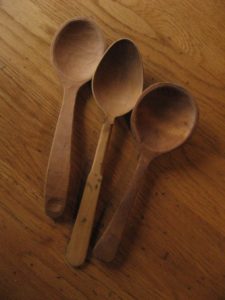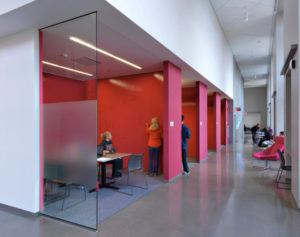This spring, after my first spoon carving class of the season, I got a call from Lynne Rosetto Kasper, of the Splendid Table. She did a show about earthen ovens years ago, but wanted to talk spoons — Wow! What could be more fun?! I sent her some spoons and a pages of enthusiastic spoon notes…
But we needed a fancy sound room to do the interview; it took a few weeks of wrangling to schedule a time w/the folks at Oregon State U. in Corvallis. Ironically, the location was a brand new building called the Learning Integration Center. Tho it’s beyond me how they hope to “integrate” learning in what must be about the coldest, most sterile, flattest, deadest place you could possibly design. I went back outside in order to gather some thoughts and write some notes.
There is a direct, physical relationship between feeling and thinking. When we think w/out feeling, or feel w/out thinking, I think we miss at least half of any situation in which we might find ourselves. Science begins to confirm this as we explore how the heart, for one example, is involved in the complex neural pathways that make up our intellectual processes. I also find it interesting that in the etymology of English, our words “think” and “thank” share a common root. Could it be that facts and knowledge are related to feelings of gratitude? How does that work? And how is it that we’ve come to believe that “integrating learning” requires taking people out of nature? No amount of pink paint can give life to a flat, dead, sterile box…
So it seems to me natural and proper for smart people to realize that they’re missing a piece of the puzzle — and that that piece is (in part, at least) the piece that we can hold in our hands — the flesh of the plants and animals that we eat, as well as the wood, clay, stone, water, and fire that we use to fabricate all the artifacts of culture. What better place to begin than a spoon?
To meet my appointment w/Lynn I rode up in a glaring, stainless steel elevator box to the 4th floor, found a glass walled office with the right number on the door, and was directed (surprise!) to the “isolation room.” The kind of isolation they’re talking about is what the sensitive machinery needs in order to record a human conversation that will broadcast clearly for a radio audience — isolation that is, incidentally, completely unnecessary for human ears and brain, which can both make out the variations in human speech as well as filtering out ambient noise.
Talking w/Lynn is the opposite of isolating, tho. What she does on her show is pretty amazing — like a hostess who not only cooks a marvelous meal, but manages to introduce and engage all her guests in a common conversation where everyone gets a chance to tell the part of the story that most excites and inspires them. Here’s a bit about spoons:
http://www.splendidtable.org/story/the-art-of-the-spoon


Hi Kiko. I’ve been doing greenwood spoon carving for about three years. That’s why a friend shared your Splendid Table interview with me. Well done. I’m sorry to see that I missed all of your workshops this summer.
After looking at your blog, I realized I am pretty sure I know you. It’s been years, and you actually knew my girlfriend Renee more than you knew me. We lived together in Corvallis until 1997 when we moved to Portland…so it’s been nearly 20 years.
You once gave me a couple of sketches that you did – simple line sketches of a nude female figure. I’m sad and embarrassed to admit that I don’t know where they are. You said they were just “exercises” but I really loved them.
If you come back for another spoon carving workshop, maybe we can catch up.
Yay!~ yes! more via email…